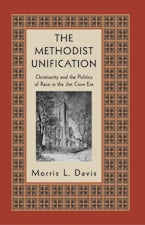The Methodist Unification
Christianity and the Politics of Race in the Jim Crow Era
In the early part of the twentieth century, Methodists were seen by many Americans as the most powerful Christian group in the country. Ulysses S. Grant is rumored to have said that during his presidency there were three major political parties in the U.S., if you counted the Methodists.
The Methodist Unification focuses on the efforts among the Southern and Northern Methodist churches to create a unified national Methodist church, and how their plan for unification came to institutionalize racism and segregation in unprecedented ways. How did these Methodists conceive of what they had just formed as “united” when members in the church body were racially divided?
Moving the history of racial segregation among Christians beyond a simplistic narrative of racism, Morris L. Davis shows that Methodists in the early twentieth century—including high-profile African American clergy—were very much against racial equality, believing that mixing the races would lead to interracial marriages and threaten the social order of American society.
The Methodist Unification illuminates the religious culture of Methodism, Methodists' self-identification as the primary carriers of "American Christian Civilization," and their influence on the crystallization of whiteness during the Jim Crow Era as a legal category and cultural symbol.
Contributor Bios
Reviews
"A discerning, sober, and troubling probing of the preoccupation within the Methodist Church with Christian nationalism, civilization as defined by white Anglo-Saxon manhood, and race, race consciousness and & the problem of the Negro that was foundational to and constitutive of a reunited Methodism. A must read for students of early 20th century America." ~ Russell E. Richey,Emory University
"Draws upon previously neglected primary sources to offer a ground-breaking analysis of the intertwined political, racial, and religious dynamics at work in the institutional merging of three American Methodist denominations in 1939. Davis boldly examines the conflicted ethics behind a dominant American religious cultures justification and preservation of racial segregation in the reformulation of its post-slavery institutional presence in American society. His work provides a much-needed, critical discussion of the racial issues that pervaded American religion and culture in the early twentieth century." ~ Wendy J. Deichmann Edwards,Academic Dean and Associate Professor of History and Theology, United Theological Seminary, Dayton Ohio
"The Methodist Unification underscores the immense power that race has held in American, and Methodist, consciousness, and its ability to shape the politics of both church and state." ~ Church History
"“Morris L. Davis has made a major contribution to the literature in this examination of the denominational cultures that resulted in the racial segregation of the Central Jurisdiction of the Methodist Episcopal Church." ~ Choice
 This work is licensed under a
Creative Commons Attribution-NonCommercial-ShareAlike 4.0 International License
(CC BY-NC-SA).
This work is licensed under a
Creative Commons Attribution-NonCommercial-ShareAlike 4.0 International License
(CC BY-NC-SA).


